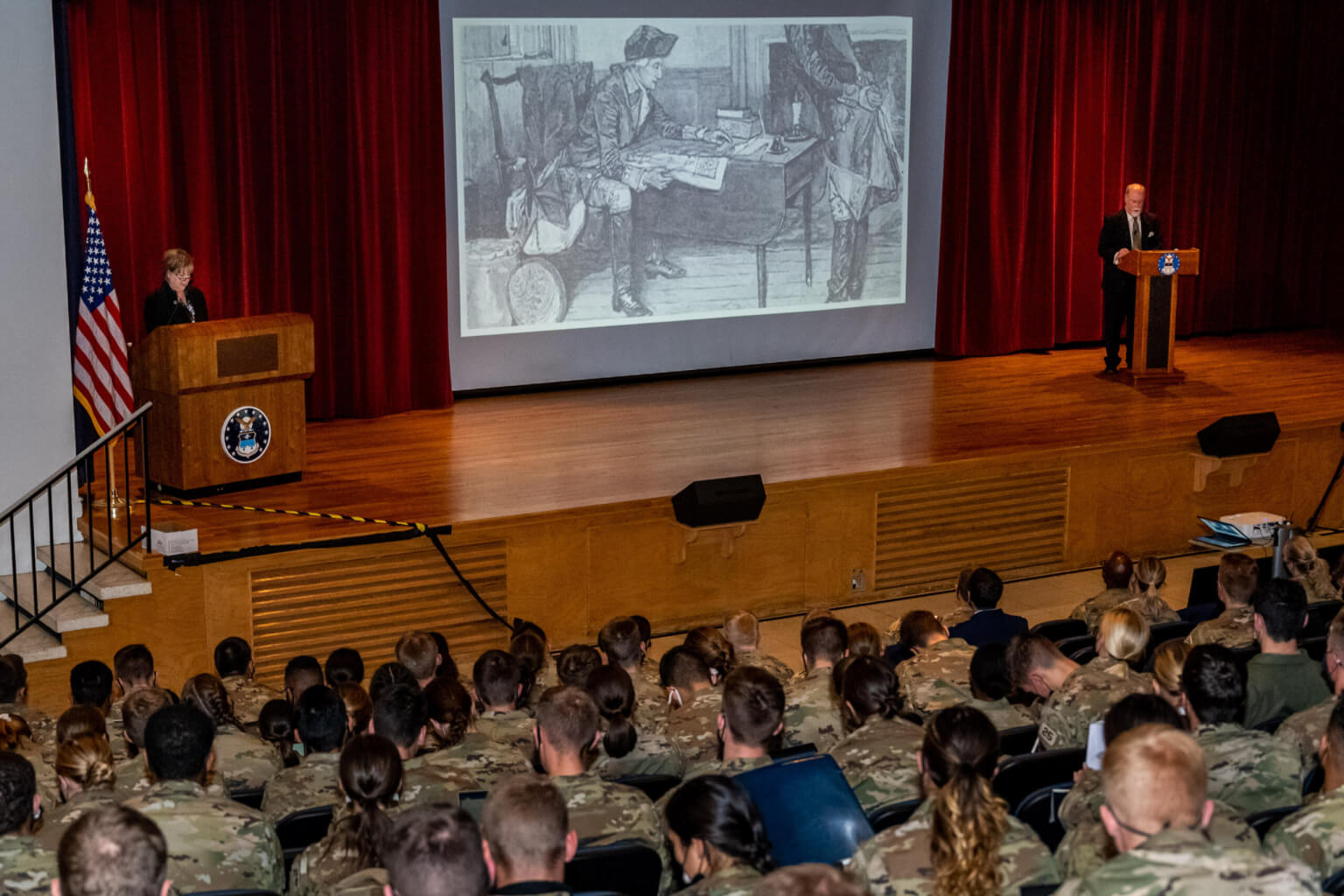Historians encourage cadets to balance justice, mercy at Harmon Memorial lecture

Story by Ray Bowden, photo by Justin Pacheco
U.S. AIR FORCE ACADEMY, Colo. – Popular historians with ties to the Air Force Academy said mercy mitigates the fray of war and civil conflict.
The husband and wife team of David and Jeanne Heidler were the featured speakers at the Harmon Memorial Lecture, the school’s most prominent lecture series, in Fairchild Hall, Oct. 5.
The Heidlers each have doctorates in U.S history from Auburn University, Alabama, and have wrote 12 books on the early-American republic, the antebellum period and Civil War.
“The American Revolution was unlike anything that had occurred anywhere else in the world,” Jeanne Heidler said, with David Heidler pointing to the era’s “protest, revolt and “simmering tensions” dividing the populace, a time when acts of mercy often resulted in public disdain.
The theme of the Heidlers’ presentation, “Mercy Bears Richer Fruits,” highlighted the mercy shown by Continental Army general and first U.S. president George Washington; Army Gen. Andrew Jackson; and Texas Army Gen. Sam Houston.
Strategic Decisions
Thomas Hickey was a Continental Army soldier during the American Revolutionary War hanged for mutiny, sedition and treachery, June 28, 1776. Washington ordered his death after finding him guilty of conspiring with the British to assassinate Continental generals, including Washington, himself. Washington hoped Hickey’s execution would warn others but, at the same time, Jeanne Heidler said, extended mercy to roughly a dozen political figures associated with the plot. He “let them go” after they escaped prison.
“[Washington] would rather face embarrassment than a threat,” she said. “By allowing Hickey’s associates to escape, he decreased those simmering societal tensions.”
In 1813, Jackson led an army of volunteers to New Orleans to defend the region against British attacks and came into conflict with Muskogee Indians led by William Weatherford. Jackson routed the Muskogee Indians at the Battle of Horseshoe Bend, in the Mississippi Territory, now central Alabama, and went on a quest to find and kill Weatherford. After the battle, Weatherford appeared in Jackson’s camp to plead with the general to spare the lives of the Muskogee Indians. Weatherford believed he’d be killed outright, but Jackson surprised him, David Heidler said.
“Though an unpopular decision,” he said, “Jackson spared Weathorford’s life.”
Houston’s victory at the Battle of San Jacinto, the decisive conflict in the Texan war for independence against Mexico in 1836, led to a peace treaty compelling the Mexican army to leave the region, steering the then-Republic to become an independent country.
Houston defeated Gen. Antonio López de Santa Anna’s Mexican army in a battle lasting 18 minutes. Santa Ana was taken a prisoner of war the next day, April 22, but Houston let him return to Mexico, even though Santa Ana has bayoneted and shot Texas Army soldiers at the battle of the Alamo earlier that year.
“Houston understood the importance of strength leavened by compassion,” Jeanne Heidler said.
Washington, Jackson and Houston weighed the balance of justice and mercy when making strategic decisions to affect the future of the U.S., David Heidler said.
“No one was weak or wavering,” he said, “and they were all uniquely American.”
Cadet 4th Class Samuel Quick was one of hundreds of cadets at the lecture.
“Even though swift justice, and to an extent vengeance, may be the much more appealing or popular, mercy is often the better course when looking toward the future,” he said. “It’s okay to punish people for their crimes or actions, but it is vital to take a step back and objectively examine if you get more from that than you would if you showed mercy to create better relations.”
The lecture was Quick’s first as a freshman.
“It was excellent,” he said. “It presented an applicable topic to cadets as future officers, got me thinking about decisions I might be making in a few short years and the impact they could have.”
The annual lecture’s namesake, Lt. Gen. Hubert Harmon, was the Academy’s first superintendent.
Jeanne Heidler is a professor emeritus of history at the Academy.